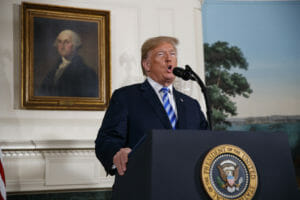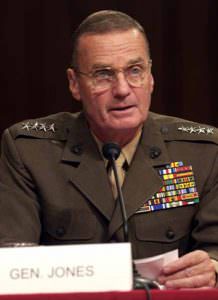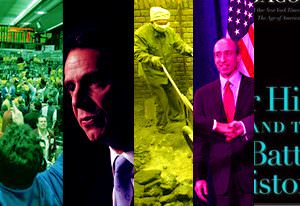Bush the Infallible
Remember that long-ago news conference when George W. Bush couldn't think of any mistakes he had made? Unbelievably, he still can't.Remember that long-ago news conference when George W. Bush couldn’t think of any mistakes he had made? Unbelievably, he still can’t.
When ABC’s Charles Gibson, interviewing Bush at Camp David, asked the president what one “do-over” he’d like to have, this was Bush’s reply:
“I don’t know — the biggest regret of all the presidency has to have been the intelligence failure in Iraq. A lot of people put their reputations on the line and said the weapons of mass destruction is a reason to remove Saddam Hussein. It wasn’t just people in my administration; a lot of members in Congress, prior to my arrival in Washington, D.C., during the debate on Iraq, a lot of leaders of nations around the world were all looking at the same intelligence. And, you know, that’s not a do-over, but I wish the intelligence had been different, I guess.”
Fellow sufferers from Bush Derangement Syndrome, mind your blood pressure. Just seven more weeks. Hang in there, because there are two more snippets from the interview that I have to quote.
When Gibson asked whether there would have been an Iraq war if Bush had known that Saddam had no WMD, Bush replied: “You know, that’s an interesting question. That is a do-over that I can’t do. It’s hard for me to speculate.” And when Gibson asked Bush what was his greatest accomplishment, he got this response: “I keep recognizing we’re in a war against ideological thugs and keeping America safe.”
Observe the astounding selectivity of the president’s memory. Just imagine all the other do-overs he could have asked for. He might regret not paying more attention to the Aug. 6, 2001, presidential daily briefing memo, which was titled “Bin Laden Determined to Strike in U.S.” and reported “patterns of suspicious activity in this country consistent with preparations for hijackings or other types of attacks.” He might wish he hadn’t put the nation’s emergency response capability in the hands of Michael Brown, a former executive of the International Arabian Horse Association, and then watched from afar as New Orleans drowned. The president might have volunteered, as he did in a previous interview, that his “Mission Accomplished” photo-op on the deck of the USS Abraham Lincoln was a moment he’d like to have back.
But no. Instead, he told Gibson that his “biggest regret” was a mistake made by others: intelligence analysts who got it wrong about Iraq.
The only inference we can draw is that if the intelligence had been more skeptical of Saddam’s WMD prowess, there might not have been an Iraq war. Bush’s “hard for me to speculate” dodge notwithstanding, this seems to be the story the outgoing administration wants to tell. Karl Rove recently sounded this same revisionist theme, saying that “absent weapons of mass destruction” there likely would have been no invasion.
But there was plenty of skeptical intel about Iraq’s alleged WMD, particularly its nuclear program — the potential “mushroom cloud” that Condoleezza Rice so chillingly evoked. Shaky or ambiguous reports — such as the bogus document about Iraq’s attempt to buy yellowcake uranium in Niger — were presented as gospel. International nuclear inspectors, meanwhile, were inside Iraq doing their job.
There’s another problem with the way Bush is trying to rewrite history. After U.S. forces combed Iraq for WMD and established that none existed, the administration came up with other backdated rationales for the invasion. Vice President Cheney even kept insisting on some link with 9/11 that only he could perceive; after a while, nobody paid him any attention.
Bush spoke of having liberated Iraqis from the savage rule of a tyrant — which is true, but that wasn’t the reason we were originally told we had to go to war. The president spoke of having created a democracy in the heart of the Middle East, one that would shoot tendrils of freedom to take root throughout the region — which is a hard story to sell when the war’s greatest geopolitical impact has been to strengthen theocratic Iran to the point that it dares to dream of ancient Persian glory.
Bush pats himself on the back for keeping his eye on the ball — the “war against ideological thugs.” But those ideological thugs are ensconced somewhere, probably in the lawless frontier territories of Pakistan, rebuilding their murderous networks and plotting new attacks. I’m betting that they don’t regret Bush’s decision to invade Iraq, either.
Eugene Robinson’s e-mail address is eugenerobinson(at)washpost.com.
© 2008, Washington Post Writers Group
Your support matters…Independent journalism is under threat and overshadowed by heavily funded mainstream media.
You can help level the playing field. Become a member.
Your tax-deductible contribution keeps us digging beneath the headlines to give you thought-provoking, investigative reporting and analysis that unearths what's really happening- without compromise.
Give today to support our courageous, independent journalists.






You need to be a supporter to comment.
There are currently no responses to this article.
Be the first to respond.